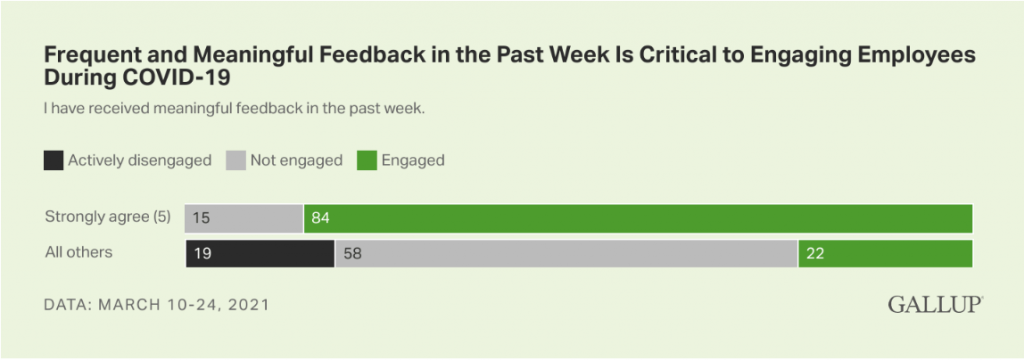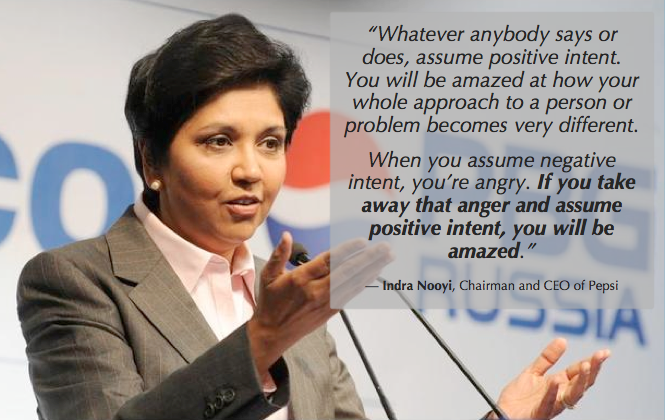Do you ever feel like you're working hard, but not getting enough feedback from your manager to know if you're on the right track? You’re not alone.
Most people want to know how they’re doing on a frequent basis, not just during their annual review. According to research by Gallup, employees who strongly agree that they received actionable feedback on their work in the past week are almost 4 times more likely to be highly engaged.

That means that while feedback may at times sting a bit to hear, when it’s meaningful and helpful, it can fuel not just better performance, but make you enjoy your work more.
Unfortunately, many managers struggle to provide regular feedback. Despite many having the best of intentions to get around to giving feedback, most fall short for reasons like:
- They’re very busy and are shortchanging it for other priorities
- They think you’re doing good enough, so don’t feel the need to call anything out
- They’re not well trained on how to give feedback, so they avoid it
- They’re afraid to communicate with their team and have what they fear will be a hard conversation
As an employee, this can be quite frustrating. No one wants surprises at review time, nor an awkward situation where you think you’re crushing it and they secretly disagree.
But what if you could change that trend? What if you could learn how to ask your manager for feedback in a way that gets the results (and feedback) you’re looking for?
Just because your manager isn't proactively offering feedback doesn't mean you can't take steps to encourage them to give you more feedback. There’s actually a lot you can do to make it easier for them.
Today's guide is all about taking control of the feedback discussion. We'll cover how you can make it easier and more common for your manager to provide feedback on your work. In doing so, you’ll learn and grow more, and set yourself up for better performance reviews.
You might even impress your manager, setting you up for more raises and promotions if you follow through on the advice and feedback they give you.
Table of contents
- Prepare yourself before requesting feedback from your manager
- Asking for feedback from your manager
- Use your 1 on 1s to get detailed feedback from your manager
- Remember to be Specific & Prepared!
- Be ready for criticism from your manager
- Final Word: You get back what you put into asking for feedback from your manager

Prepare yourself before requesting feedback from your manager
The key to getting helpful feedback from your manager, even if they’re very busy, is to make the process easy for them. If they don’t have to do a lot of thinking and effort before reviewing your work, they’re much more likely to make the time and be willing to give you feedback.
That means doing your part to prepare when asking for feedback. That includes nailing the timing of when you ask, asking in a specific and helpful way, and choosing the right things to get feedback on.
Let’s look in more detail at how you can cover all your bases and ask for feedback in the best way possible.

Pick specific aspects of your performance
When requesting feedback from your manager, it's important to focus your questions on recent and relevant work rather than broad, general areas. Doing so helps them focus their efforts on areas that will have the highest impact on both of you.
Good areas to ask for feedback on include:
- Key projects you recently completed, or are currently working on
- Specific skills and competencies you've developed lately
- Your individual goals for the month/quarter/year
Take some time to review your goals and look for alignment with your manager's goals; this creates a win-win opportunity where their feedback helps both of you. You get the feedback you want to improve, and your manager sees that this helps hit the goals that matter most to them.
To really make this hit home, frame your request for feedback to highlight how this feedback relates to the key projects or goals you’re both working towards. They’re busy, so don’t assume it’s as obvious to them as it is to you.
To help you do this, before you meet with them, reflect on your work and ask yourself these questions:
- What aspects are you less confident in? What areas do you think your work could be better?
- How do those areas impact your team, and the results you’re trying to get?
- Of all the areas you could get feedback on, which do you think would have the greatest impact on your mutual goals? How could you convey that to your manager?
Then, connect those answers to team goals and targets. Convey that explicitly to your manager to show how their feedback has value for both of you
When you know how to link your growth to your and your manager’s goals, you're ready to have a focused, healthy feedback discussion with your manager.
Asking for Feedback from your manager
If you wait for your manager to give you feedback spontaneously, you may be waiting a long time. This is why so often people go the whole year and then are surprised by their manager at the end of the year.
Instead, you should take the initiative to request it, which when you follow the process we outline today, will make the process easier for both of you.
Whether you send an email, ask them in person, or send a chat message is less important than how you ask it. The key is to put into words what we suggested last section.
It can be as simple as a message (or saying):
“Hi Joe - I’m really trying to work on my presentation skills this quarter. I was just working on the presentation for our big enterprise client we’re trying to close and wanted your feedback on the flow and content of my deck. Can you take a look and let me know what I could change and improve?”
What you’ll notice with this message is that it covers all the keys we discussed:
- It explains what topics you want feedback on. (presentation skills)
- It references a specific task you want them to review. (the big enterprise client presentation)
- It ties it to a key goal (the enterprise client you both want to close)
- You tell them where to focus their feedback (flow and content)
By taking this approach, you are making the incentives and motivation for them clear, as well as making it super easy to focus their efforts even if they can only spare 15 minutes to potentially give you feedback.
But asking for feedback is only part of the equation. You also want to make sure you fully understand their feedback and act on it. That’s where your 1 on 1s can really power up your drive for more feedback from your manager.
Use your 1 on 1s to get detailed feedback from your manager
One of the most effective ways to get detailed, constructive feedback from your manager is to use your existing 1-on-1 meetings. These meetings are already on your calendars, so you avoid having to request extra time. Instead, you're taking the initiative to get more value from sessions meant for you.
Most managers appreciate when their team members play an active role in their 1-on-1s instead of relying on the manager to drive every discussion.
To make feedback part of your 1-on-1, let your manager know you're specifically seeking their feedback on whatever you’ve settled on from our last section of this post.
What if I don’t have 1 on 1s?
If regular 1-on-1s aren’t a common practice in your organization, or your manager doesn’t have them with you, then this is a good time to request you start having them. Feedback is just one of many things you can talk about in the meetings and get value for both of you.
If you need help, we have you covered with a post that teaches you how to convince your boss to start 1-on-1s, and more about how you can make them great every week here.
It can be scary at first to ask for these, but it’s well worth the effort.
Tell your manager ahead of time
It’s great to have a discussion about feedback in your 1-on-1, but for it to be a great discussion, your manager needs to have already reviewed your work before the meeting. That means you need to tell them.
Ahead of the meeting, put "Requesting Feedback on X Project" (or whatever you are targeting feedback for) directly on the 1-on-1 agenda you share with your manager. Here is an example of a message for requesting feedback from your manager:
“Hi Joe - I’d like your feedback on my recent work on the New Client proposal; I want to be sure I have the right structure and flow so we definitely get them closed before the end of the quarter. Can you take a look before my 1-on-1 so we can go over your thoughts in our meeting?”
And here is a formula for you:
"Hi [manager name] - I'd like your feedback on my work on the [X project], specifically on [aspect you want feedback on and why it's important] before our 1-on-1 so we can discuss your thoughts."
This gives your manager fair notice to review your work and prepare their thoughts to share with you then.
Email/messenger feedback requests
Sometimes your feedback doesn’t fit in a 1-on-1. That may be for a few good reasons:
- It’s time-sensitive or too long before your next 1 on 1. While you should meet at least once a month, and ideally every 1-2 weeks, sometimes the feedback needs to happen even less than a week from now (if you’re on a deadline).
- You already have a full agenda. If there are urgent matters like a pending crisis, team challenges, or a continuing conversation, it might be best to ask for feedback separately since it takes time, and these other issues need immediate attention.
- It’s easier to get the feedback another way. If you usually do a walk and talk with your manager, or they need to take your next 1 on 1 as a call because they’re traveling, then getting feedback separately could be a much better idea. This also applies well if the feedback could come in a pull request, comments right in the document, or otherwise in a system suited for it.
- You expect it to be quick feedback. If you have just one thing you’re looking for, then it’s often easier to get the feedback right away. For example, you might say “Does this flow well?” or “Did I miss anything in this pitch deck?”, and for singular, specific requests for feedback, it’s easier to get it right away. Only if they have major problems with your work would you then say, “Okay, let’s dig in more in my 1 on 1.”
Now that you know this is something better suited for a quick message with asynchronous feedback from them, you can send a simple message similar to what we suggested for requesting feedback for your next 1-on-1:
Something like
“Hi Joe, I’d like your feedback on my recent work on the New Client proposal; I want to be sure I have the right structure so we definitely get them closed before the end of the quarter. Can you take a look and make any comments in the document for anything you’d change, tweak, or add?”
And a formula for you:
“Hi [manager name], I’d like your feedback on my recent work on the [X project/task/presentation/etc]; I want to be sure [aspect you want them to focus their feedback on], because [reason it’s important to both of you]. Can you take a look and make any [method to give feedback] in the [work output format] for [type of feedback you want]?”
Make it easy for your manager!
When requesting feedback, it's crucial to reduce every possible point of friction for your manager to make the process as simple as possible. Whether discussing live or asynchronously, apply these tips:
- Organize materials clearly. If there are multiple documents to review, compile them in one place. Use clear naming conventions and make it structured, so that things can quickly be found.
- Provide direct access. Make it impossible for them to waste a second. Give them everything they need to immediately jump into your work. That means a link to the document, attaching the presentation directly, or including the pull request right there with your ask.
- Tell them *exactly* what to focus on. It’s great to give them the documents/file/link to review, but that’s not enough alone. Make it easy and obvious for them to know *what* feedback you want and where to focus their efforts. What page? What section? What do you want feedback on? Tell them.
Every second they spend trying to find your work is a second not giving you feedback and potentially giving up without giving you any feedback at all.
The easier you make it for your manager to jump right into your work and provide feedback, the more likely you will get thoughtful, constructive feedback. That’s win-win and will get you more feedback going forward because they know you made it easy for them last time.
Remember to be Specific & Prepared!
Making the initial request sets the stage, but there is more you can do to maximize the value of the feedback you receive from your manager.
While your manager reviews your work, there is still more for you to do. The best ways you can prepare at this point is to:
- Be specific: Remember what you were most looking for feedback on. Make sure the feedback from your manager includes mentions of that, or you may want to remind them or ask specifically about it.
- Ask questions: Isn’t it great when your manager practices active listening with you? They ask follow-up questions and repeat back what they think they heard until you agree they understand. You should do the same here.
- Review your work, too: Sometimes a break can give you fresh eyes. Make sure you review your work so you’re familiar with its strengths, weaknesses, and structure so it’s easy to go over things quickly with your manager.
The more you do your part to prepare for both asking for feedback and then thoroughly understanding what your manager shares, the more you’ll get out of your request. This helps you make the most of the time and effort your manager puts in, and encourages them to do it again in the future.

Ask Good Questions, Just Like Your Manager Does of You
Simply receiving feedback from your manager is not enough — you need to truly understand what they mean to improve. A good manager asks questions, and in this case, you can ask good questions of your manager to make the most of the feedback you’re receiving.
Once you’re in the 1-on-1 meeting where they’re going over feedback for you, ask your manager questions like:
- What were your first impressions as you reviewed my work?
- What stood out to you the most? Why that specifically?
- What’s the most important thing you want me to change or improve on based on what you reviewed? Why is that important to you?
After you receive their initial answers, you can dive even more deeply by asking questions like these:
- It sounds like that’s really significant to you — can you tell me more about why?
- Can you provide an example of that done well? (for something you didn’t do well)
- How would you have approached this differently? What principles or considerations make that approach effective?
Finally, to make sure this feedback turns into real improvement for you, commit to action by asking for resources and support going forward:
- Who on our team or at our company do you think exemplifies excellence in this area? Could you connect us, so I can learn from them?
- What resources do you recommend that could help me improve here?
- How did you learn to get better at this? What methods were most effective for you?
- Let me make another attempt at improving this. When would you have time to review my work again? (to make sure you hit your deadline and fit their schedule)
Remember: Your manager is taking time out of their busy schedule to help you develop. While it’s mutually beneficial for them to see you improve, it’s still on you to put maximum effort into understanding and applying their feedback.
By asking questions like the ones we suggest, you set yourself up to have the greatest likelihood of improving in the ways that your manager believes are most important.

Be ready for criticism from your manager
One final aspect to consider is your mindset heading into your feedback session. Hearing critical feedback from your manager can be difficult, but how you handle it shows your maturity and readiness to receive feedback going forward. y.
This isn’t always easy, but it’s part of growing and succeeding at work. If you’re having a hard time receiving feedback from your manager, try practicing these tactics::
- Pause first and thank your manager for caring enough to provide feedback to help you grow. This gives you something to say before having to react to what they’ve told you, which can make it easier to take in.
- Before responding further, ask clarifying questions to ensure you fully understand their perspective and where you can improve.
- Discuss possible solutions or additional context instead of defending yourself. Focus on how you can improve going forward.
Remember — feedback is a gift, not an insult you should take personally. By adopting this mindset, you show your manager you’re willing to work to get better. And keep in mind that if your manager takes the time to give you feedback, that means they believe in your potential and trust you can improve. Otherwise, why would they bother?
The more gracefully you accept constructive criticism, the more comfortable your manager will feel giving you more coaching and feedback in the future.
Final Word: You get back what you put into asking for feedback from your manager
Requesting meaningful feedback from your manager is an investment that pays dividends in your growth and development. While it requires effort on your part to prepare and have a healthy discussion, doing so fuels your continuous improvement.
It will not only help you get the growth and feedback you crave, but any manager worth their salt will appreciate the effort you put in. They’ll hold you in higher esteem and see you as someone who takes initiative.
But your work only begins when you get the feedback. The best reputation you can build is that you act on the feedback you receive; if you quickly show strong signs of improvement based on their feedback, they’ll want to give you more feedback, because the effort is worth it. It also then makes you a more appealing candidate for future promotions, bonuses, and other recognition, both because your skills keep growing, and they’ll feel more confident you can take on new challenges.
Taking ownership of your growth and development is an ongoing process that pays off over time. If you're looking for more ways to grow, check out these additional posts:
Further reading:
- How to Become a Manager: A Guide for Aspiring Leaders
- How You Can Get More Feedback From Your Team (If you are a manager)
- How to Drive Your Own Career Growth In These 6 Easy Steps
Key takeaways
- Be proactive in requesting feedback instead of waiting for your manager to do it on their own
- Be thoughtful and decide exactly what you want feedback on instead of making a vague request
- Use your 1-on-1s to go over detailed feedback together to get the most of it
- Make the feedback process easy by organizing materials and questions for them ahead of time
- Ask clarifying questions to ensure you fully understand their feedback and how you can best act on it to improve
- Accept their constructive criticism gracefully and follow through on their recommendations to encourage and reward your manager for taking the time to give you feedback
Are you growing as a leader? Are you building the skills you need?
Whether your team is in office with you or remote, Lighthouse Lessons can teach you the skills you need to better lead, motivate, and grow your team. Let us help you navigate the unique challenges of being a leader like we helped Daniel by learning more and signing up here.





